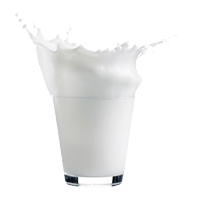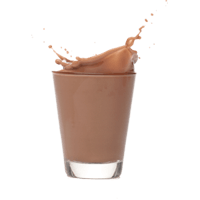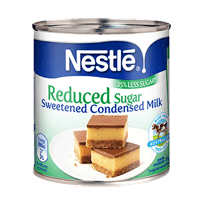Buttermilk nutrition: calories, carbs, GI, protein, fiber, fats
Milk, buttermilk, fluid, cultured, lowfat
*all the values are displayed for the amount of 100 grams
Top nutrition facts for Buttermilk
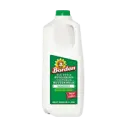
| Calories ⓘ Calories for selected serving | 40 kcal |
|
Glycemic index ⓘ
Source: Check out our full article on Buttermilk glycemic index Check out our Glycemic index chart page for the full list.
|
N/A (-) |
| Net Carbs ⓘ Net Carbs = Total Carbohydrates – Fiber – Sugar Alcohols | 5 grams |
| Default serving size ⓘ Serving sizes are mostly taken from FDA's Reference Amounts Customarily Consumed (RACCs) | 1 cup (245 grams) |
| Acidity (Based on PRAL) ⓘ PRAL (Potential renal acid load) is calculated using a formula. On the PRAL scale the higher the positive value, the more is the acidifying effect on the body. The lower the negative value, the higher the alkalinity of the food. 0 is neutral. | -0.1 (neutral) |
| Oxalates ⓘ https://www.hsph.harvard.edu/nutrition-questionnaire-service-center/nutrient-tables-download-page/ | 0 mg |
Buttermilk calories (kcal)
| Calories for different serving sizes of buttermilk | Calories | Weight |
|---|---|---|
| Calories in 100 grams | 40 | |
| Calories in 1 fl oz | 12 | 30.6 g |
| Calories in 1 cup | 98 | 245 g |
| Calories in 1 quart | 392 | 980 g |
| Calories for different varieties of buttermilk | Calories | Weight |
|---|---|---|
| Milk, buttermilk, fluid, cultured, lowfat (this food) | 40 | 100 g |
| Milk, buttermilk, fluid, whole | 62 | 100 g |
| Milk, buttermilk, dried | 387 | 100 g |
Extra Nutrition facts for Buttermilk
| Protein per 100 calories ⓘ Shows how many grams of protein you get from 100 calories of this food, calculated as (protein in g ÷ calories) × 100. | 8.3 g |
| Calories per 10 g protein ⓘ Shows how many calories you need to eat from this food to get 10 g of protein, calculated as (calories ÷ protein in g) × 10. | 121 kcal |
Buttermilk Glycemic index (GI)
Source:
Check out our full article on Buttermilk glycemic index
Check out our Glycemic index chart page for the full list.
Mineral coverage chart
Mineral chart - relative view
Vitamin coverage chart
Vitamin A:
42µg of 900µg
4.7%
Vitamin E:
0.15mg of 15mg
1%
Vitamin D:
0µg of 20µg
0%
Vitamin C:
3mg of 90mg
3.3%
Vitamin B1:
0.1mg of 1mg
8.5%
Vitamin B2:
0.46mg of 1mg
36%
Vitamin B3:
0.17mg of 16mg
1.1%
Vitamin B5:
0.83mg of 5mg
17%
Vitamin B6:
0.1mg of 1mg
7.8%
Folate:
15µg of 400µg
3.8%
Vitamin B12:
0.66µg of 2µg
28%
Vitamin K:
0.3µg of 120µg
0.25%
Vitamin chart - relative view
Macronutrients chart
Protein:
Daily Value: 7%
3.3 g of 50 g
3.3 g (7% of DV )
Fats:
Daily Value: 1%
0.9 g of 65 g
0.9 g (1% of DV )
Carbs:
Daily Value: 2%
4.8 g of 300 g
4.8 g (2% of DV )
Water:
Daily Value: 5%
90.1 g of 2,000 g
90.1 g (5% of DV )
Other:
0.9 g
0.9 g
Protein quality breakdown
Tryptophan:
126mg of 280mg
45%
Threonine:
423mg of 1,050mg
40%
Isoleucine:
513mg of 1,400mg
37%
Leucine:
939mg of 2,730mg
34%
Lysine:
831mg of 2,100mg
40%
Methionine:
261mg of 1,050mg
25%
Phenylalanine:
513mg of 1,750mg
29%
Valine:
651mg of 1,820mg
36%
Histidine:
300mg of 700mg
43%
Fat type information
Saturated fat:
0.55 g
Monounsaturated fat:
0.25 g
Polyunsaturated fat:
0.03 g
Fiber content ratio for Buttermilk
Sugar:
4.8 g
Fiber:
0 g
Other:
0 g
All nutrients for Buttermilk per 100g
| Nutrient | Value | DV% | In TOP % of foods | Comparison |
| Vitamin A | 14µg | 2% | 46% | |
| Calories | 40kcal | 2% | 91% |
1.2 times less than Orange
|
| Protein per 100 calories | 8.3g | N/A | 30% | |
| Protein | 3.3g | 8% | 69% |
1.2 times more than Broccoli
|
| Calories per 10 g protein | 121kcal | N/A | 35% | |
| Fats | 0.88g | 1% | 76% |
37.9 times less than Cheese
|
| Vitamin C | 1mg | 1% | 42% |
53 times less than Lemon
|
| Carbs | 4.8g | 2% | 61% |
5.9 times less than Rice
|
| Net carbs | 4.8g | N/A | 57% |
11.3 times less than Chocolate
|
| Cholesterol | 4mg | 1% | 54% |
93.3 times less than Egg
|
| Vitamin D | 0µg | 0% | 100% |
N/A
|
| Magnesium | 11mg | 3% | 82% |
12.7 times less than Almonds
|
| Calcium | 116mg | 12% | 20% |
1.1 times less than Milk
|
| Potassium | 151mg | 4% | 70% |
Equal to Cucumber
|
| Iron | 0.05mg | 1% | 95% |
52 times less than Beef broiled
|
| Sugar | 4.8g | N/A | 48% |
1.9 times less than Coca-Cola
|
| Fiber | 0g | 0% | 100% |
N/A
|
| Copper | 0.01mg | 1% | 95% |
12.9 times less than Shiitake
|
| Zinc | 0.42mg | 4% | 73% |
15 times less than Beef broiled
|
| Phosphorus | 89mg | 13% | 67% |
2 times less than Chicken meat
|
| Sodium | 190mg | 8% | 43% |
2.6 times less than White bread
|
| Vitamin E | 0.05mg | 0% | 91% |
29.2 times less than Kiwi
|
| Manganese | 0mg | 0% | 98% | |
| Selenium | 2µg | 4% | 77% | |
| Vitamin B1 | 0.03mg | 3% | 80% |
7.8 times less than Pea raw
|
| Vitamin B2 | 0.15mg | 12% | 57% |
1.2 times more than Avocado
|
| Vitamin B3 | 0.06mg | 0% | 94% |
165.1 times less than Turkey meat
|
| Vitamin B5 | 0.28mg | 6% | 76% |
4.1 times less than Sunflower seeds
|
| Vitamin B6 | 0.03mg | 3% | 86% |
3.5 times less than Oats
|
| Vitamin B12 | 0.22µg | 9% | 58% |
3.2 times less than Pork
|
| Vitamin K | 0.1µg | 0% | 88% |
1016 times less than Broccoli
|
| Folate | 5µg | 1% | 79% |
12.2 times less than Brussels sprouts
|
| Choline | 18mg | 3% | 77% | |
| Saturated fat | 0.55g | 3% | 68% |
10.8 times less than Beef broiled
|
| Monounsaturated fat | 0.25g | N/A | 76% |
38.6 times less than Avocado
|
| Polyunsaturated fat | 0.03g | N/A | 92% |
1429.5 times less than Walnut
|
| Tryptophan | 0.04mg | 0% | 87% |
7.3 times less than Chicken meat
|
| Threonine | 0.14mg | 0% | 86% |
5.1 times less than Beef broiled
|
| Isoleucine | 0.17mg | 0% | 86% |
5.3 times less than Salmon raw
|
| Leucine | 0.31mg | 0% | 86% |
7.8 times less than Tuna Bluefin
|
| Lysine | 0.28mg | 0% | 82% |
1.6 times less than Tofu
|
| Methionine | 0.09mg | 0% | 84% |
1.1 times less than Quinoa
|
| Phenylalanine | 0.17mg | 0% | 87% |
3.9 times less than Egg
|
| Valine | 0.22mg | 0% | 86% |
9.4 times less than Soybean raw
|
| Histidine | 0.1mg | 0% | 86% |
7.5 times less than Turkey meat
|
| Caffeine | 0mg | 0% | 100% | |
| Omega-3 - EPA | 0g | N/A | 100% |
N/A
|
| Omega-3 - DHA | 0g | N/A | 100% |
N/A
|
| Omega-3 - DPA | 0g | N/A | 100% |
N/A
|
Check out similar food or compare with current
NUTRITION FACTS LABEL
Nutrition Facts
___servings per container
Serving Size ______________
Serving Size ______________
Amount Per 100g
Calories 40
% Daily Value*
1.4%
Total Fat
0.88g
2.5%
Saturated Fat 0.55g
0
Trans Fat
0g
1.3%
Cholesterol 4mg
8.3%
Sodium 190mg
1.6%
Total Carbohydrate
4.8g
0
Dietary Fiber
0g
Total Sugars 0g
Includes ? g Added Sugars
Protein
3.3g
Vitamin D
1mcg
0.13%
Calcium
116mg
12%
Iron
0.05mg
0.63%
Potassium
151mg
4.4%
*
The % Daily Value (DV) tells you how much a nutrient in a serving of food contributes to a daily diet. 2,000 calories a day is used for general nutrition advice.
Health checks
ⓘ
Dietary cholesterol is not associated with an increased risk of coronary heart disease in healthy individuals. However, dietary cholesterol is common in foods that are high in harmful saturated fats.
Source
Low in Cholesterol
ⓘ
Trans fat consumption increases the risk of cardiovascular disease and mortality by negatively affecting blood lipid levels.
Source
No Trans Fats
ⓘ
Saturated fat intake can raise total cholesterol and LDL (low-density lipoprotein) levels, leading to an increased risk of atherosclerosis. Dietary guidelines recommend limiting saturated fats to under 10% of calories a day.
Source
Low in Saturated Fats
ⓘ
While the consumption of moderate amounts of added sugars is not detrimental to health, an excessive intake can increase the risk of obesity, and therefore, diabetes.
Source
Low in Sugars
Buttermilk nutrition infographic
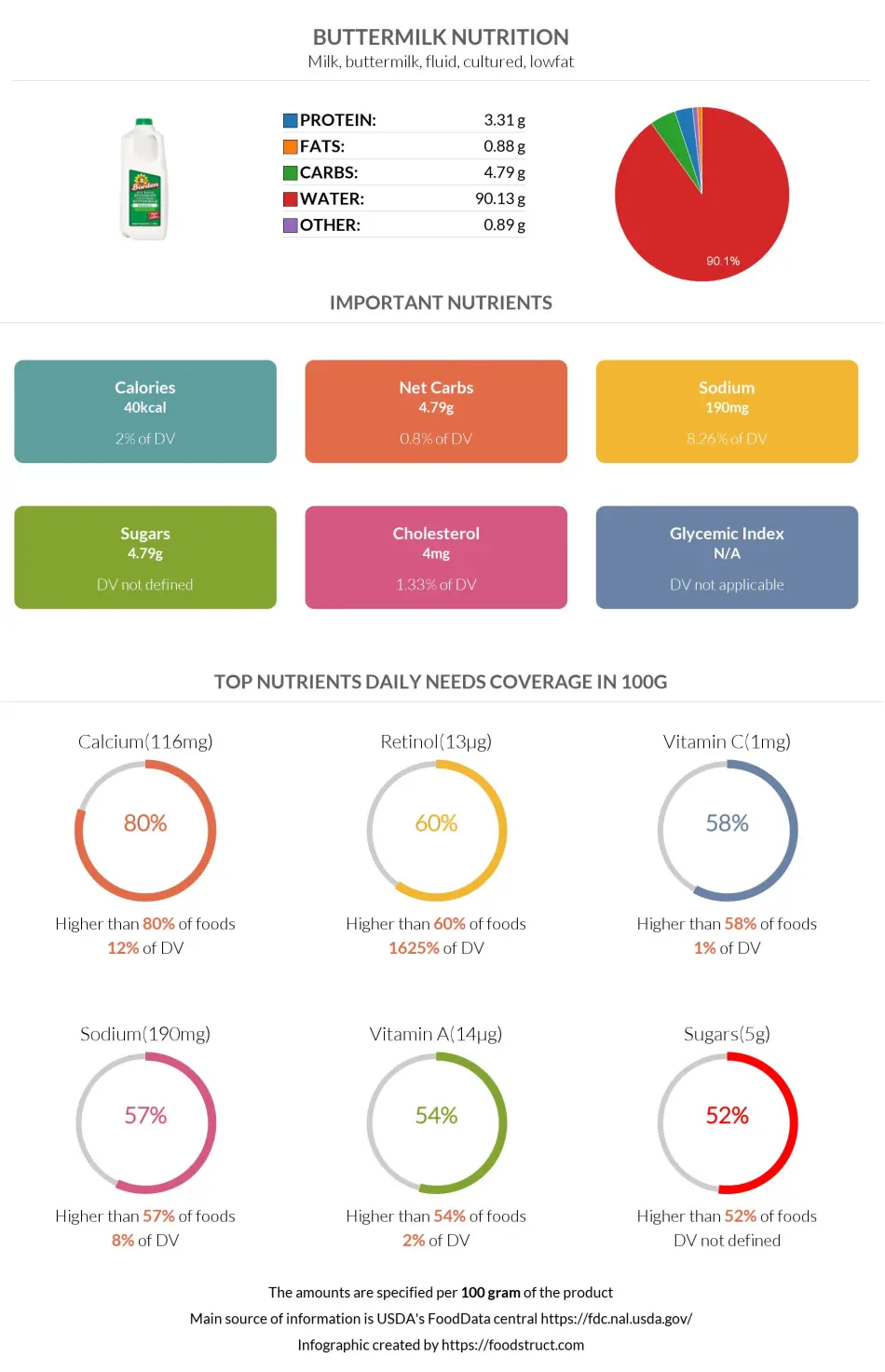
Infographic link
References
All the values for which the sources are not specified explicitly are taken from FDA’s Food Central. The exact link to the food presented on this page can be found below.
